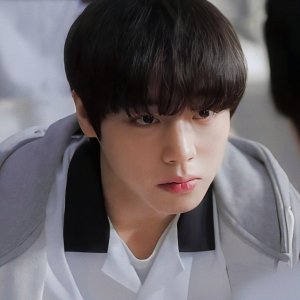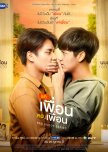the cycle of grief (=the cycle of love)
Bad Buddy feels very much like a universal love story. It is the young adult version of a coming of age story centering, ultimately, around the idea of peace over revolution when facing the familial cycles of love and neglect. Pran and Pat were not able to become the friends they should have been in childhood due to their parents’ rivalry and hatred towards each other. They had to repress this friendship, and thus parts of themselves, to fit into the standards that were made for them.
Growing up, you figure out who you are, the basics of your identity, stemming from how you were raised. From your relationship to your parents-- the foundation of who you are-- you start to identify what you are, and of course, what you are NOT; what are you, and what is the “OTHER”? What do you relate to, who do you not relate to? Where do your loyalties lay? How do you dream? What do you dream of? How do you cope? What kind of child were you? (What kind of parent are you?) How do you view love? Is it an obligation? Is it a competition? Is it completely unmarked, unexplored and unknown territory?
Whether through deep thought or an innate ability to know yourself, you put yourself in these boxes, or you cross the line between you and the other. You are sometimes given the chance to reject the box. But how do you go against your upbringing? How do you compensate for the habits, weaknesses, fears, way of communication, that you’ve known forever? What if our parents were wrong? What happens if they have wronged us? Do you ever need to forgive your parents?
What are the barriers in love?
In Bad Buddy we see how the past greatly influences the way Pat and Pran become, and how they try to be together despite the odds, what feels like their whole world telling them to not be together. Some dreams our cast keeps, some dreams our cast lets go. Some become the “other,” and they all find their own family. They learn they cannot change the world, but they should never let the world change each other. They choose acceptance and peace over completely revolutionizing their lives for the greater good of the love they created and learned-- though that acceptance in itself is an act of revolution.
And all of this was portrayed so beautifully. :')
Growing up, you figure out who you are, the basics of your identity, stemming from how you were raised. From your relationship to your parents-- the foundation of who you are-- you start to identify what you are, and of course, what you are NOT; what are you, and what is the “OTHER”? What do you relate to, who do you not relate to? Where do your loyalties lay? How do you dream? What do you dream of? How do you cope? What kind of child were you? (What kind of parent are you?) How do you view love? Is it an obligation? Is it a competition? Is it completely unmarked, unexplored and unknown territory?
Whether through deep thought or an innate ability to know yourself, you put yourself in these boxes, or you cross the line between you and the other. You are sometimes given the chance to reject the box. But how do you go against your upbringing? How do you compensate for the habits, weaknesses, fears, way of communication, that you’ve known forever? What if our parents were wrong? What happens if they have wronged us? Do you ever need to forgive your parents?
What are the barriers in love?
In Bad Buddy we see how the past greatly influences the way Pat and Pran become, and how they try to be together despite the odds, what feels like their whole world telling them to not be together. Some dreams our cast keeps, some dreams our cast lets go. Some become the “other,” and they all find their own family. They learn they cannot change the world, but they should never let the world change each other. They choose acceptance and peace over completely revolutionizing their lives for the greater good of the love they created and learned-- though that acceptance in itself is an act of revolution.
And all of this was portrayed so beautifully. :')
Vond je deze recentie nuttig?





